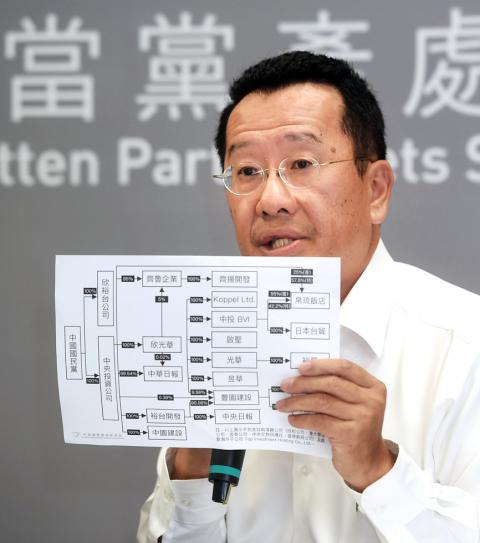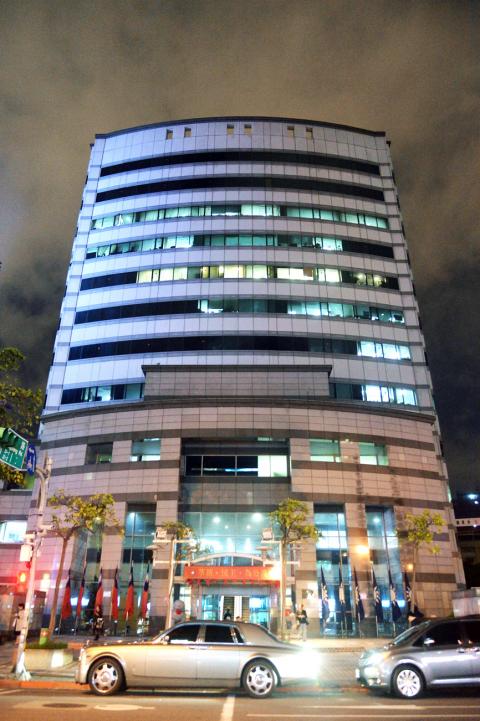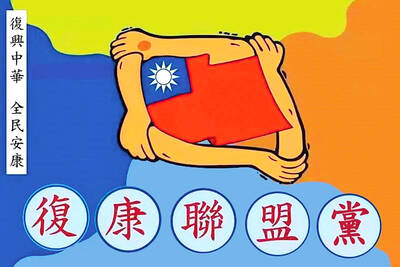The Chinese Nationalist Party (KMT) must transfer all its rights to shares issued by Central Investment Co (中央投資公司) and Hsinyutai Co (欣裕台) to the government, the Ill-gotten Party Assets Settlement Committee said yesterday, after concluding that the two companies were founded using illegally obtained assets.
Committee Chairman Wellington Koo (顧立雄) said the committee would send the KMT a letter of disposition no later than Tuesday and give it 30 days to comply with the assets transfer.
The “rent” the KMT pays for its headquarters on Taipei’s Bade Road, Sec 2 — registered under Central Investment and Hsinkuanghua Co (欣光華股份有限公司) — must be paid to the government after the transfer of shareholding rights, Koo told a news conference after the committee meeting.

Photo: Fang Pin-chao, Taipei Times
Central Investment is a wholly owned holding company of the KMT, while Hsinkuanghua is a fully owned subsidiary of Central Investment, the committee’s investigation found.
The KMT in late July signed a five-year contract with Central Investment and Hsinkuanghua to lease the building and paid the rent — totaling about NT$320 million (US$10 million) — in advance, despite not having allocated any funds for the rent this year, Koo said, adding that the KMT probably secured the lease out of fear of having its ill-gotten assets seized.
Citing the committee’s investigation, Koo rebutted KMT Administration and Management Committee director Chiu Da-chan’s (邱大展) claims on Thursday that Central Investment’s and Hsinyutai’s capital came from legitimate sources.

Photo: CNA
“In an era when there was no distinction between the party and the state, half of the KMT’s revenue came from state subsidies, while its affiliated organizations provided about 20 percent, and it had some other sources of income,” Koo said.
The KMT’s legitimate assets and income from the so-called “special surcharges” it levied on businesses to increase the national defense budget made up a tiny portion of its revenue, he said.
However, with the exception of 1959 and 1961, in which the then-KMT administration produced a surplus of NT$1.2 million and NT$220,000 respectively, the KMT had been mired in deficit from 1953 to 1971, accumulating a debt of NT$253.5 million, Koo said.
“How could the KMT have had NT$200 million of government securities when it founded Central Investment in 1972?” Koo said.
The committee has rejected the KMT’s request that it cash in Central Investment’s and Hsinyutai’s shares and property holdings to pay its employees’ pension and severance packages, because it would run counter to the commission’s decision that the KMT transfer the firms’ shareholding rights.
However, to allow the party to pay its employees’ health and labor insurance premiums, land taxes and pension, the committee has decided to unfreeze the KMT’s account at Bank SinoPac (永豐銀行), which has more than NT$350 million.
Including the rent it paid in advance and money in the account, the KMT has NT$1.25 billion from its legal sources of capital, including nine checks worth NT$468 million made payable to it by the Bank of Taiwan, the NT$100 million the Chang Yung-fa Foundation owes the party and NT$9 million in advance payments it made to an attorney, Koo said.
He urged the KMT to use this money to deal with fees it needs to pay its employees.

AIR DEFENSE: The Norwegian missile system has proved highly effective in Ukraine in its war against Russia, and the US has recommended it for Taiwan, an expert said The Norwegian Advanced Surface-to-Air Missile Systems (NASAMS) Taiwan ordered from the US would be installed in strategically important positions in Taipei and New Taipei City to guard the region, the Ministry of National Defense said in statement yesterday. The air defense system would be deployed in Taipei’s Songshan District (松山) and New Taipei City’s Tamsui District (淡水), the ministry said, adding that the systems could be delivered as soon as the end of this year. The US Defense Security Cooperation Agency has previously said that three NASAMS would be sold to Taiwan. The weapons are part of the 17th US arms sale to

SERIOUS ALLEGATIONS: The suspects formed spy networks and paramilitary groups to kill government officials during a possible Chinese invasion, prosecutors said Prosecutors have indicted seven retired military officers, members of the Rehabilitation Alliance Party, for allegedly obtaining funds from China, and forming paramilitary groups and assassination squads in Taiwan to collaborate with Chinese troops in a possible war. The suspects contravened the National Security Act (國家安全法) by taking photos and drawing maps of key radar stations, missile installations and the American Institute in Taiwan’s headquarters in Taipei, prosecutors said. They allegedly prepared to collaborate with China during a possible invasion of Taiwan, prosecutors said. Retired military officer Chu Hung-i (屈宏義), 62, a Republic of China Army Academy graduate, went to China

INSURRECTION: The NSB said it found evidence the CCP was seeking snipers in Taiwan to target members of the military and foreign organizations in the event of an invasion The number of Chinese spies prosecuted in Taiwan has grown threefold over a four-year period, the National Security Bureau (NSB) said in a report released yesterday. In 2021 and 2022, 16 and 10 spies were prosecuted respectively, but that number grew to 64 last year, it said, adding that the Chinese Communist Party (CCP) was working with gangs in Taiwan to develop a network of armed spies. Spies in Taiwan have on behalf of the CCP used a variety of channels and methods to infiltrate all sectors of the country, and recruited Taiwanese to cooperate in developing organizations and obtaining sensitive information

BREAKTHROUGH: The US is making chips on par in yield and quality with Taiwan, despite people saying that it could not happen, the official said Taiwan Semiconductor Manufacturing Co (TSMC, 台積電) has begun producing advanced 4-nanometer (nm) chips for US customers in Arizona, US Secretary of Commerce Gina Raimondo said, a milestone in the semiconductor efforts of the administration of US President Joe Biden. In November last year, the commerce department finalized a US$6.6 billion grant to TSMC’s US unit for semiconductor production in Phoenix, Arizona. “For the first time ever in our country’s history, we are making leading edge 4-nanometer chips on American soil, American workers — on par in yield and quality with Taiwan,” Raimondo said, adding that production had begun in recent